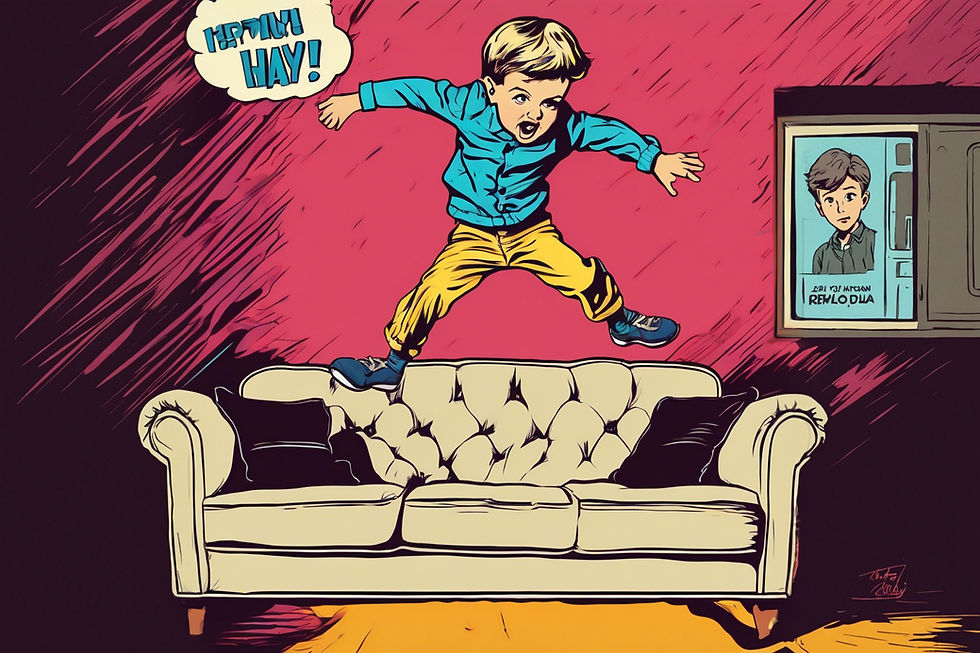Helping Your Child Overcome Impulsivity: What Works and Why
- Justin Lyons

- Feb 20
- 4 min read
"Impulse control is like a muscle—the more you use it, the stronger it gets. But skip leg day, and you’re in trouble." — Unknown

Impulsivity can make everyday life challenging for kids, whether it’s interrupting conversations, acting without thinking, or struggling to follow directions. As a parent, helping your child develop self-control is a process that requires patience, consistency, and the right strategies. And if your child has ADHD, you might be wondering—is it even possible for them to manage their impulsivity? The short answer: Yes! With the right tools, kids can absolutely improve impulse control over time. Here’s how.
Can Kids with ADHD Really Learn to Manage Impulsivity?
Yes, research shows that kids with ADHD can develop better self-regulation skills with structured support. ADHD affects executive function—the brain’s ability to plan, focus, and control impulses—but that doesn’t mean kids are stuck struggling forever. Science-backed strategies can rewire their brains over time, helping them gain better control over their reactions and choices. Here’s what works:
👉 Cognitive Behavioral Therapy (CBT): Helps kids recognize impulsive thoughts and develop healthier responses. Studies show it improves impulse control and emotional regulation.👉 Mindfulness Training: Teaching kids to pause and be aware of their emotions can reduce knee-jerk reactions. Research supports mindfulness for improving attention and self-control in ADHD kids.👉 Behavioral Strategies: Positive reinforcement, structured routines, and visual cues help kids slow down and make better decisions.👉 Medication (When Needed): While not for everyone, medication combined with behavioral strategies is often the most effective approach for managing impulsivity.
Now that we know it’s possible, let’s get into the strategies you can use at home to support your child:
Best Tips for Helping Your Kid Manage Impulsivity
As I mention to many clients who have a child or are a person with ADHD, it takes a little longer to develop those executive function skills fully (if ever). Despite that, it does not mean all is lost. Maybe the most frustrating conditions to work on are executive functioning skills. You can work for years on an executive skill set, see mixed improvement or as Paula Abdul would sing, "2 steps forward, and 2 steps back". However, what is really crazy is that once that frontal lobe matures, it just clicks into place! SO PLEASE KNOW THAT ALL THE TIME AND EFFORT YOU PUT INTO HELPING SOMEONE WITH EXECUTIVE FUNCTIONING SKILLS WILL EVENTUALLY WORK IF YOU ARE CONSISTENT!
Another thing that is important to keep in mind, is helping you or your kid understand the terms. Especially in the beginning stages of my work with a new client, I like to make sure they know about their bodies and mind. I especially (and this is probably the most important) go over terms that we assume every kid knows or understands. For example, when you tell your kid, "Stop being so impulsive!!!!", do they actually know what you mean? Going over terms and explaining what you mean when you provide feedback or discipline to your kid, helps a ton!
1. Teach the Power of the Pause
Encourage your child to take a deep breath or count to five before reacting. Teaching them to create a small gap between impulse and action helps build self-awareness and control over their behavior.
2. Model Self-Control
Our mirror neurons fire like crazy when we are young! Kids learn by watching, so demonstrate patience and thoughtful decision-making in your daily interactions. If you get frustrated, verbalize how you’re handling your emotions: “I feel upset, but I’m going to take a deep breath before I respond.”
3. Use Visual and Verbal Cues
Sometimes a simple hand signal, a keyword like “pause,” or a visual chart with reminders can help kids slow down before acting impulsively. Reinforce these cues with positive reinforcement when they use them effectively.
4. Set Clear and Consistent Expectations
Make sure your child understands household and classroom rules. Use simple, direct language and remind them regularly of what’s expected so they can internalize self-regulation strategies.
5. Encourage Physical Outlets
Kids with high energy levels often struggle with impulsivity. Structured movement breaks, sports, or sensory activities like jumping or squeezing a stress ball can help them release energy in a positive way.
6. Help Them Identify Triggers
Work with your child to recognize what situations make impulsivity worse—whether it’s fatigue, overstimulation, or frustration. Once they’re aware, you can help them develop strategies to navigate these moments.
7. Reinforce Positive Behavior
Rather than focusing solely on mistakes, praise moments when your child shows self-control. Use specific feedback like, “I noticed you raised your hand instead of shouting out—that was great self-control!”
8. Use Social Stories or Role-Playing
Create short stories or role-play common situations where they struggle with impulsivity. Practicing appropriate responses in a safe environment prepares them for real-life challenges. I find it very helpful to work on recognizing environments or situations where impulsivity may be an issue and prepare your child for them before it occurs!
9. Implement a “Redo” Strategy
Instead of immediately punishing impulsive behavior, allow a do-over. Ask, “Let’s try that again in a better way,” to help them practice making more thoughtful choices.
10. Be Patient and Stay Positive
Managing impulsivity is a skill that takes time to develop. Celebrate small improvements, offer encouragement, and remember that growth happens through consistent support and guidance. Especially with your ADHD child, consequences do not have as much as an impact on them as positive feedback does. What is intersting about this is that many ADHD people are very bright and cognitively understand that something could be dangerous or a behavior they have is impulsive, but the issue is being able to utilize that knowledge in the moment.

Helping your child navigate impulsivity isn’t about eliminating it altogether—it’s about equipping them with the tools to manage it effectively. With practice, patience, and the right strategies, kids can absolutely strengthen their self-regulation skills and build confidence in handling everyday challenges. You got this! 💪
And if you need help with this, definitely reach out to me! I really love helping someone learn about themselves and arm them with the confidence and tools to improve their daily life skills. Sign up for a free consultation below, what do you have to lose?










Комментарии